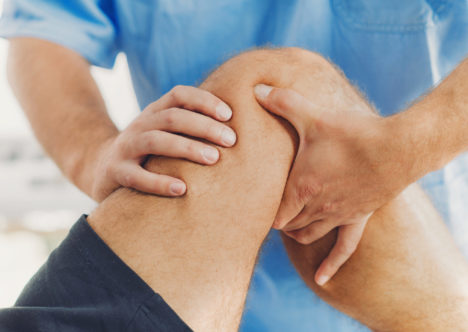Use our convenient online scheduler to book an appointment now.

This year is no different than others; every January, the gyms fill up with people trying to fulfill their New Years’ resolution – to “get in shape.” So there they are on the treadmill trying to burn off their holiday pounds and improve their health. I always encourage people to exercise. For numerous reasons, regular exercise is very beneficial to your health. But is it enough by itself to get you from being obese back to a more appropriate weight? Usually not.
Obesity is a huge (no pun intended!) problem worldwide, particularly in the US and Western world. It is a significant factor in the development of adult-onset heart disease, diabetes, stroke, high blood pressure, several forms of cancer, depression, and death. As a result, it is the second leading cause of adult mortality. Additionally, obesity is known to be a risk factor for musculoskeletal pain and arthritis. It’s not uncommon for me to see a patient who is obese, diabetic, has high blood pressure, depression, and knee arthritis. Many of these patients also have low back, hip, ankle, and feet pain as well. So for many of us, reducing our weight is the most important thing that we can do to improve our health.
Knowing that, it is not surprising that so many of us are trying to weight loss easy. What’s unfortunate, is that so many of us fail at doing so.
Our failure is usually due to a misunderstanding of how to lose weight and maintain a healthy body size. For those who are extremely obese, losing weight can be a complicated proposition, sometimes requiring aids, even surgery. That discussion is beyond the scope of this post. For the vast majority of us, losing weight is rather simple…in concept. Although often difficult to carry out.
Many think that exercise is the answer. That’s why the gyms swell after the new year. The key to losing weight for most of us, however, is not in the minutes we exercise but rather in the calories we consume.
What Are Calories?
Calories are a measure of the energy content of a given food. Unfortunately, many of the calories in today’s diets are “empty.” That is they have no, or little, nutritional benefit — all the bad without any good. Many of our diets consist of large portions of processed, low nutrient foods. Much of the processed food that we consume today has barely any nutritional benefit whatsoever.
Additionally, calories have never been cheaper than they are now. A calorie today costs on average only 1/10 of a cent. That means that if you consume 2000 calories a day, that day’s worth of calories will cost you about $2. At minimum wage, this comes out to about 17 minutes of work to earn a day’s food requirement. Compare this to earlier times, when people worked an entire day for their daily caloric needs. For this and other reasons, our portions, meal size, and daily caloric intake are much more significant. So we consume large amounts of food that have very little nutritional value.
Your body uses energy, and calories, to break down and utilize your food. However, because much of our food is processed (read: partially digested), these foods use minimal calories to be absorbed. They also provide very little energy when used. As a result, consuming these foods leaves us depleted and hungry shortly after eating. As a result, we often then eat even more of these foods…and their calories.
And If that wasn’t enough…
We are a very sedentary society. Whereas our ancestors’ days were typically filled laboring, the vast majority of modern western jobs are inactive and therefore burn minimal calories. Worse, many of our leisure activities (i.e., watching TV, dining, driving, etc.) are sedentary as well.
And therein lies the problem. We consume a tremendous number of calories while using only a few. Our energy expenditure must equal our caloric intake to maintain a particular weight over time. For us to lose weight, our caloric intake must be less than our daily energy needs. And for most, that is not the case… not by a long shot.
So what’s the answer?
There are three components to losing weight – Just three!. Once again, the formula is simple – Carrying it out is what’s difficult.
1. Eat Less
This is the essential component of any weight loss program. The math is simple. If you want to lose weight, you must eat fewer calories than you need each day. Many foods today are so calorie rich, that you can’t possibly burn them off with exercise. Jogging at a moderate rate will burn about 10-12 calories a minute – An hour run, will utilize 600-700 calories. The same for biking. It takes only 20 minutes to eat a 1080 calorie Big Mac meal. There isn’t enough free time in the day to exercise away excess calories if you don’t curb your eating. Most of us have no idea how many calories we need each day to lose the weight we want. Even less of us know how many calories are in our everyday foods.
So use some aids to help. Fortunately, there are many free resources to help you identify your daily caloric needs and help you count the calories you consume. Two more popular ones are: My Fitness Pal and Lose It. Start with these. Even just cutting back a little in your daily calories can make a big difference in your overall health. In time, eating less will become a habit, and you will know which foods and how much of each you can and can’t eat.
2. Eat Better
As mentioned, much of our food is highly processed, loaded with sugars, salt, and fat that are bad for your health and of very little nutritional value. There are many adverse health effects directly from these fatty, sugar-filled, over-processed foods in addition to the excess calories they provide. By eating more natural, one ingredient foods, you will reduce your sugar, salt, unhealthy fat, and processed foods. As a result, you will burn more calories, increase your energy, lose weight and improve your overall health.
3. Exercise More
It’s hard to get healthy without moving. But it’s hard to move enough to lose weight without the other changes mentioned. Nonetheless, the positive health effects of exercise are substantial. Most importantly exercise burns more calories. Not only does this get rid of the calories you take in, but it also enables you to take in more calories without gaining weight. Exercise, therefore, allows many of us who like to eat, to eat more and still lose weight. Additionally, exercise can increase your metabolism which will increase your utilization of calories over and above what any activity requires. Finally, exercise has been shown to increase your energy – and increasing your energy enables you to be even more active and burn even more calories.
But be careful…
If you haven’t exercised in a while, see your doctor first and start slow. If you’re new to exercise, incorporate more activity into your day. Walk up to the second floor. Then take the elevator. Park at the back of the lot instead of looking for the closest spot near the front. Walk your dog. Just move!. Slowly add more and more motion and then an exercise program. Remember, the goal is to change habits and change your health. This will often take time and require a sustained effort. An injury might jeopardize any progress. So it’s best to go slow and stay active rather than to jump in, get injured and be back on the couch.
Exercise Alone Is Not Enough…
There probably is no better mechanism for improving your health than to lose excessive body weight. Although easy in principle, it is challenging for many to carry out. The hardest part is that it requires a sustained and often a lengthy effort. My advice is to start slowly. Reduce your calories and only pick one of the other components discussed above. Either increase your exercise or eat better. The goal is to get forward momentum. By just cutting calories, you will lose weight and see success.
Doing too much too soon can be very difficult and can lead to failure. Over time, you will naturally adopt the third component. As you feel better, you will find that eating more natural foods makes you feel even better. By exercising more, you will be able to “buy” additional calories and eat more. Soon, you will be thinner, healthier…and will be feeling much healthier.
Join our Mailing List
TCO provides patients with orthopedic problems the trusted resources and patient-centered advice they need to “Feel Better. Move Better. Be Better.”
© 2024 Town Center Orthopaedics | All Rights Reserved


